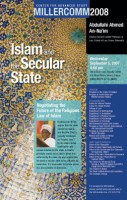Islam and the Secular State: Negotiating the Future of the Religious Law of Islam
Third Floor, Levis Faculty Center 919 West Illinois Street Urbana
Professor An-Na'im argues that the state cannot be Islamic and that the Shari'a (usually translated as "Islamic Law") by its nature defies codification and implementation by the state. A Shari'a principle ceases to be Shari'a when it is enforced by the state. He also argues that he needs a secular state to be a Muslim by conviction, it is impossible to believe unless it is also possible to disbelieve.
Hosted by: Program for the Study of Religion, Program in South Asian and Middle Eastern Studies
In conjunction with: Center for African Studies, Center for Global Studies, College of Law, Department of Anthropology, Department of Journalism, Department of Political Science, Department of Psychology, Department of Sociology, International Programs and Studies, Program in Arms Control, Disarmament, and International Security, Program in Comparative and World Literature, Women and Gender in Global Perspectives Program
Charles Howard Candler Professor of Law, School of Law, Emory University

